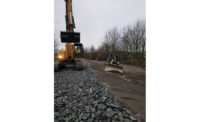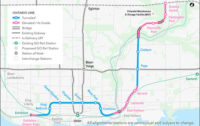Vinci Construction has begun work on a giant flood control project in Alberta designed to prevent a repeat of one of the most devastating natural disasters in Canadian history.
The French infrastructure giant leads construction of the Springbank off-stream reservoir nine miles west of Calgary, a $580-million project to divert flood waters before they reach the city.
The project is an outgrowth of a catastrophic 2013 flood that surged into the city, causing more than $5 billion in damage. More than 14,000 homes and 1,500 business were damaged, many beyond repair, while 125,000 people were evacuated.
Most of the project funding, about $449 million, is coming from the province of Alberta, officials said.
“This is one of the largest infrastructure projects ever undertaken in the province and funded primarily by the province of Alberta,” Premier Jason Kenney said at a press event held earlier this month to announce the start of work on the project. “We must be prepared for the next major flood and to prevent damage of that scale.”
Vinci’s assignment, which is expected to last three years, involves building a 29-m-high earthen structure that will stretch roughly 2.3 miles along the Elbow River, along with a water intake and a 2.6-mile-long diversion channel. More than 5 million cu m of material will be needed to build the project, according to Vinci.
During peak flooding events, the new dry reservoir, dam and intake channel—all expected to be up and running by 2025—will serve as a safety valve for the river during flood season, diverting and storing water until it can be released. The 3,700-acre reservoir will have the capacity to temporarily store 78 million cu m of water, Kenney said.
Overall, the project is expected to create 2,200 construction jobs, with Vinci’s contract estimated at $235 million. The global infrastructure company, based outside of Paris, has 5,200 employees in Canada and 260,000 across the world.
The dry-reservoir and flood-control project has been years in the making. First proposed in 2014, it took until 2021 to gain necessary provincial and federal approvals.
Some residents from the Springback area near Calgary were opposed, pushing for an alternative location, as was the Tsuutʼina Nation. The nation and one local group, Rocky View County, finally dropped their objections in 2020 after agreeing to millions in compensation, according to Great West Media.
“Calgarians, particularly in the flood zones have been anxious and waiting for this project to get underway,” Kenney said.





Post a comment to this article
Report Abusive Comment